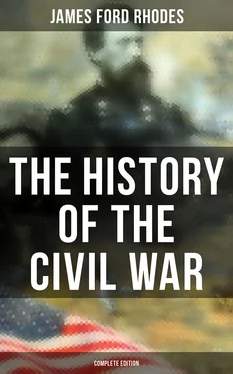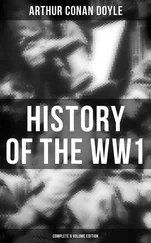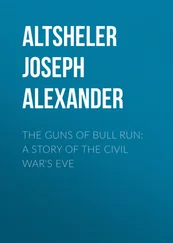James Ford Rhodes - The History of the Civil War (Complete Edition)
Здесь есть возможность читать онлайн «James Ford Rhodes - The History of the Civil War (Complete Edition)» — ознакомительный отрывок электронной книги совершенно бесплатно, а после прочтения отрывка купить полную версию. В некоторых случаях можно слушать аудио, скачать через торрент в формате fb2 и присутствует краткое содержание. Жанр: unrecognised, на английском языке. Описание произведения, (предисловие) а так же отзывы посетителей доступны на портале библиотеки ЛибКат.
- Название:The History of the Civil War (Complete Edition)
- Автор:
- Жанр:
- Год:неизвестен
- ISBN:нет данных
- Рейтинг книги:5 / 5. Голосов: 1
-
Избранное:Добавить в избранное
- Отзывы:
-
Ваша оценка:
- 100
- 1
- 2
- 3
- 4
- 5
The History of the Civil War (Complete Edition): краткое содержание, описание и аннотация
Предлагаем к чтению аннотацию, описание, краткое содержание или предисловие (зависит от того, что написал сам автор книги «The History of the Civil War (Complete Edition)»). Если вы не нашли необходимую информацию о книге — напишите в комментариях, мы постараемся отыскать её.
This Pulitzer Prize winning book remains one of the best histories on the topic of American Civil War to this day. For the purpose of writing this comprehensive work, the author used the most authoritative documents and sources including Personal Traits of Lincoln, Life and Letters of General Meade, Diary of Gideon Welles, The Reminiscences of Carl Schurz and Official Records of the Union and Confederate Navies.
The History of the Civil War (Complete Edition) — читать онлайн ознакомительный отрывок
Ниже представлен текст книги, разбитый по страницам. Система сохранения места последней прочитанной страницы, позволяет с удобством читать онлайн бесплатно книгу «The History of the Civil War (Complete Edition)», без необходимости каждый раз заново искать на чём Вы остановились. Поставьте закладку, и сможете в любой момент перейти на страницу, на которой закончили чтение.
Интервал:
Закладка:
Missouri's governor was likewise favorable to secession, replying to the call for troops: "Your requisition, in my judgment, is illegal, unconstitutional and revolutionary in its object, inhuman and diabolical.… Not one man will the State of Missouri furnish to carry on any such unholy crusade." 72He had, however, a resolute antagonist in Francis P. Blair, Jr., a man of extraordinary physical and moral courage, of high social position in St. Louis and personally very popular. Between him and the governor, there ensued four months of political and martial manœuvring, but Blair won in the end and Missouri remained in the Union. 73
The array was now complete. Twenty-three States were pitted against eleven; twenty-two million people against nine, and of the nine, three and one-half million were slaves. Each side had peculiar advantages. 74But neither section understood the other. If the South had known that secession must result in war and that the foe would be a united North, it is doubtful if she would have proceeded to the last extremity. It is still more doubtful if the North would have fought, had she known that she must contend against a united Southern people. The remark of Chatham, "Conquer a free population of three million souls? the thing is impossible," had become an axiom of the English race. But now the North confronted five and a half million earnest and brave people, supported by three and a half million servants, who grew the food and took care of the women and children at home while the men fought in the field. The North was contending for the Union on the theory that a strong and unscrupulous minority had overridden the majority of Southerners who had no desire for secession, loathed the idea of civil war and, if protected and encouraged, would make themselves felt in a movement looking towards allegiance to the national government. Lincoln comprehended the sentiment of the North and he never gave public expression to any opinion that he did not sincerely hold. In his fourth of July message to the special session of Congress he said: "It may well be questioned whether there is to-day a majority of the legally qualified voters of any State, except perhaps South Carolina, in favor of disunion. There is much reason to believe that the Union men are the majority in many, if not in every other one, of the so-called seceded States."
I have discussed this matter so thoroughly in my History that it is unnecessary for me to recur to it at length. Nevertheless, I may observe that on returning to the subject twenty years after my first discussion of it, and on going through the original materials again, I have been more firmly convinced than before of the unanimity of the Confederate States after the President's call for troops. The citations from William H. Russell's letters to the London Times and from his Diary, which I gave in my third volume, furnish an authoritative corroboration of the other evidence. This intelligent and fair-minded man, who sympathized with the North because he hated slavery and was convinced that the invocation of State-rights was for "protection to slavery, extension of slave territory and free-trade in slave produce with the outer world," made a journey through the Southern States between April 14 and June 19, 1861, and became convinced that the people of the Confederacy were united. Summing up the results of his tour, he wrote: "I met everywhere with but one feeling, with exceptions which proved its unanimity and force. To a man the people went with their States, and had but one battle-cry, 'States'-rights and death to those who make war against them!"
In spite of his supercilious criticism, Russell wished the North to win because he foresaw in her victory the destruction of slavery. But he did not believe that she could triumph. In April, while in Charleston, he wrote, "I am more satisfied than ever that the Union can never be restored as it was, and that it has gone to pieces, never to be put together again in the old shape, at all events, by any power on earth." In New Orleans, on May 31, he set down in his Diary, "Now that the separation has come, there is not, in the Constitution, or out of it, power to cement the broken fragments together." On the steamer on the Mississippi which brought him from a Confederate camp to Cairo, he met an Englishman who was steward of the boat and not averse to giving his opinion, which Russell quotes with apparent approval of the concluding statement. "This war," the steward said, "is all about niggers; I've been sixteen years in the country, and I never met one of them yet was fit to be anything but a slave; I know the two sections well and I tell you, sir, the North can't whip the South let them do their best." 75
Mixed with the stern determination on both sides to fight out the conflict was a sincere regret that the Union should be broken. When an old gentleman, whom Russell met in Charleston, spoke of the prospect of civil war "tears rolled down his cheeks," but regarding it "as the natural consequence of the insults, injustice and aggression of the North against Southern rights" he had no apprehension for the result. Mrs. Chesnut wrote of the separation, "The wrench has been awful." When the Virginia convention was considering the ordinance of secession, one delegate, who spoke against it, became incoherent in his emotion and finally broke down sobbing. Another, who voted for it, wept like a child at the thought of rending ancient ties. 76It is Henry Adams's opinion based on his recollections of Washington in the winter of 1861 that, "Not one man in America wanted the civil war or expected or intended it." Similar was Nicolay's impression at the same period in Springfield while assisting Lincoln. "Nobody wanted war" is the word. 77And when it came, J. D. Cox and James A. Garfield, then members of the Ohio legislature, groaned at "the shame, the folly, the outrage" of "civil war in our land." 78
John T. Morse, in his biography of Lincoln, which possesses somehow the authority of a contemporary document as well as the interest of an artistic study of a great man, wrote, "Historians say rhetorically that the North sprang to arms; and it really would have done so if there had been any arms to spring to; but muskets were scarce." 79The correspondence in Volume I, Series III of the Official Records amply confirms this statement. The governors of the several States, in their communications to the United States War Department, began by asking for muskets and cannon; soon they were begging for them. Ohio was undoubtedly a fair example of the States west of the Alleghanies. McClellan, who had been appointed major-general of her volunteers, made an inspection of the State arsenal and found, a few boxes of smooth-bore muskets, rusted and damaged; two or three smooth-bore 6-pounders which had been honey-combed by firing salutes; a confused pile of mildewed harness which had been once used for artillery horses. As he went out of the door he said half humorously, half sadly, "A fine stock of munitions on which to begin a great war." 80The governor of Iowa's demand of the Secretary of War, "for God's sake send us some arms," exemplified the feeling of all. All the States wanted rifled-muskets, of which the government had only a small supply; and when they received old flint-lock muskets or the same percussioned, they felt that due attention was not being paid to their necessities. Morton, the governor of Indiana, reported that the arms received by his State were of "an inferior character, being old muskets rifled out; in very many instances," he added, "the bayonets have to be driven on with a hammer and many others are so loose that they can be shaken off." "Our boys," wrote the governor of Iowa, "don't feel willing to carry old-fashioned muskets to the field to meet men armed with better weapons." Appreciating the impotence of the Federal government, Massachusetts sent an agent to Europe with money for the purchase of improved arms and New York bought Enfield rifles in England. The governors of the several States begged for accoutrements, uniforms and clothing. There was urgent need of forage caps, infantry trousers, flannel sack coats, flannel shirts, bootees, stockings, great coats and blankets. "The government," wrote the Secretary of War to Morton, "finds itself unable to furnish at once the uniforms and clothing demanded by the large force suddenly brought into service." 81
Читать дальшеИнтервал:
Закладка:
Похожие книги на «The History of the Civil War (Complete Edition)»
Представляем Вашему вниманию похожие книги на «The History of the Civil War (Complete Edition)» списком для выбора. Мы отобрали схожую по названию и смыслу литературу в надежде предоставить читателям больше вариантов отыскать новые, интересные, ещё непрочитанные произведения.
Обсуждение, отзывы о книге «The History of the Civil War (Complete Edition)» и просто собственные мнения читателей. Оставьте ваши комментарии, напишите, что Вы думаете о произведении, его смысле или главных героях. Укажите что конкретно понравилось, а что нет, и почему Вы так считаете.












